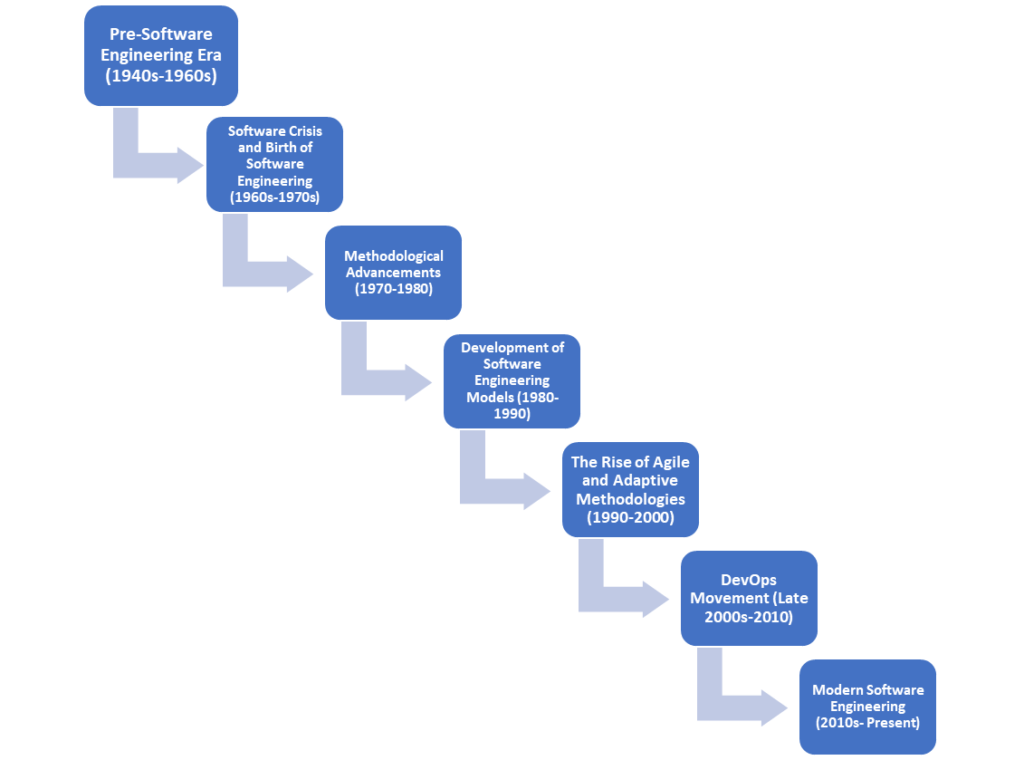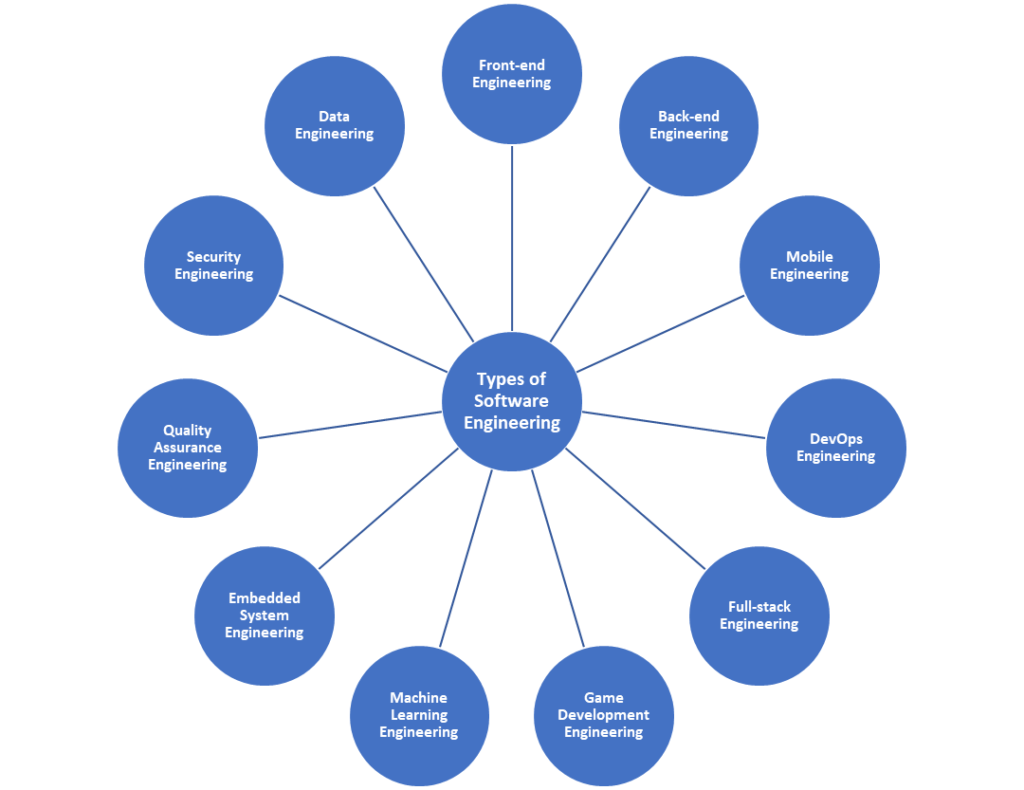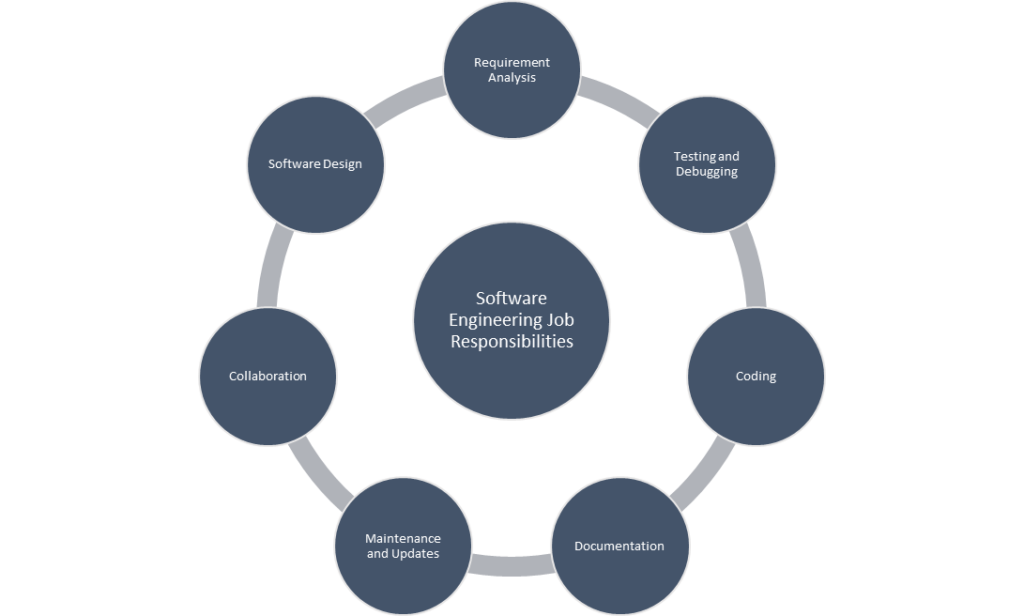Software Engineering
Software Engineering is the process of software development through professionals called software engineers.1 Software engineering involves comprehensive engineering techniques and approaches for designing, developing, testing and maintaining of software. Software engineering is a disciplined process to ensure best quality and reliability of software. Software Engineering does not only include software development but also testing of software developed from other companies and organizations.
History of Software Engineering
History of software engineering shows that at initially developed software were not too much reliable and had many flaws. There was a need of a proper system which can produce more efficient and reliable software. Following are the major incidents in the history of software engineering.

Pre-Software Engineering Era (1940s-1960s)
[1940-1950]: Invention of electronic computers marked the foundation of pre-software engineering era. Alan Turing, Grace Hopper, and John von Neuman laid the introduced the concepts of Computing and Programming Languages.
Emergence of High-level Languages (1950-1960)
High Programming Languages such as Fortan and COBOL made the software usage and access more possible.
This was the time when developers introduced structured programming to improve code clarity.
Software Crisis and Birth of Software Engineering (1960s-1970s)
[1968]: At this time there were some flaws in software, and people started calling growing issues as “software crisis”. Developers were struggling to develop software on time and within budget.
NATO Software Engineering Conference
NATO conducted world’s first software engineering conference in 1968, and experts formally introduced the term “Software Engineering”. This conference emphasized a disciplined approach for software development which was very similar to traditional engineering. The Objective behind this approach was to address the software crisis with engineering methodologies and standards that would improve quality and project management.
Methodological Advancements (1970-1980)
[1970]: Engineers adopted Structured software development approach, which included methodologies like waterfall model, a sequential approach to development phases, requirements, design, implementation, testing and maintenance. Initially waterfall model received criticism due to rigidity but later it became a crucial model for software development.
[1980]: Developers introduced object-oriented programming with languages like Smalltalk and C++. OOP made it easier to manage complex software systems and influenced other software engineering practices.
Development of Software Engineering Models (1980-1990)
[1986]: Barry Boehm introduced the Spiral Model which was a combination of iterative model and Waterfall model to manage risks and flexibility.
[1990]: Unified language was created by developers, this language was a standard to visualize system architecture, and helped in software communication and design.
The Rise of Agile and Adaptive Methodologies (1990-2000)
[2001]: A group of developers introduced Agile Manifesto, it was a people-centered, and flexible approach which emphasized on collaboration and change. It is also considered an alternative to conventional development models. Developers introduced Agile frameworks like Scrum, Extreme Programming and Kanban which revolutionized the software engineering techniques.
DevOps Movement (Late 2000s-2010)
DevOps movement unified software development and IT operations to encourage collaboration, automation and continuous delivery. DevOps movement was aimed to shorten the development cycles and increase deployment frequency.
Modern Software Engineering (2010s- Present)
Modern Software Engineering works under the slogan of Continuous integration and Continuous Deployment. Developers are using automated coding integration, high quality development tools to ensure rapid and reliable software releases. Cloud Platforms, microservices, DevSecOps, Security Integration, Artificial Intelligence and machine learning have made the software engineering more fast paced and reliable.
You can find more details for history of Software Engineering from Here2
Types of Software Engineering

Front-end Engineering
Front-end engineering involves creation of parts of websites and applications with which user normally interact. Front-end software engineer makes sure that interface of application or website is appealing for users.
Back-end Engineering
Back-end engineers create the servers, database and APIs of software. Back-end engineers monitor how data is stored, retrieved and communicated to front-end.
Full-stack Engineering
Full-stack Engineering involves both front and back-end engineering of website and applications. This involves complete processing from building to managing the server and database.
DevOps Engineering
DevOps engineers work as a bridge between software development team and IT operations team. They automate processes and help streamline development, ensuring smooth software updates.
Mobile Engineering
Mobile software engineers develop application specifically for mobiles. Sometime they also create cross-platform applications.
Data Engineering
Data Engineers build systems to collect, store, and process large amount of data for software development.
Security Engineering
Security Engineers keeps the software secure and protected from cyber threats. They apply encryption, secure coding practice, and regular testing to ensure software security.
Quality Assurance Engineering
Quality Assurance engineers find and fix bugs and vulnerabilities in the software. They do manual and automated testing to make sure that software meets the quality standards.
Embedded System Engineering
Embedded system engineers design software for specialized hardware, like IoT devices and automotive systems.
Machine Learning Engineering
Machine learning engineers build algorithm and models that allow computers to learn from data. They create applications like recommendations system and image recognition.
Game Development Engineering
Game development engineers create games for various platforms like PC, Consoles, and mobile devices.
Why is Software Engineering Important in Today’s World?
Foundation of Modern Technology and Automation
Software Engineering is the foundation of almost every modern technology. Devices and application rely on the principles of software engineering. Software engineering has introduced automation and efficiency in operations of businesses and organizations.
Driving Innovation and Economic Growth
Software Engineering has ensured innovation which brings economic growth. Every leading company like Amazon, Google, and Tesla rely o software engineering to create products and services.
Cybersecurity and Data Protection
Software engineering helps in designing cybersecurity systems which is top priority and need of every digital setup. Software engineers create secure cyber systems that protect sensitive information and ensure data integrity.
Enabling Global Connectivity
Software engineering supports in development of global communication platforms. Social media platforms, email and messaging applications are created with involvement of software engineering.
HealthCare and Environment Stability
Software Engineering has become the important part of healthcare and environment monitoring tools. Electronic health records telemedicine is helping health sector to enhance their efficacy. Also, different tools and software for environmental monitoring are providing better solutions for environmental changes.
Education and Skill Development
E-learning Platform and educational software have made education accessible to millions worldwide. Software engineering has helped a lot in creating adaptive, personalized learning for students.
Highly Rewarding Field
Software Engineering is very important for students and professionals as it is a highly rewarding field. Software engineers earn handsome salary packages than other fields. Anyone having problem solving approach with critical thinking can make his career in this emerging field.
What does a software Engineer Do?
Software Engineers create and maintain software programs to meet specific user needs. Software engineers work closely with team members and other stakeholders to design, develop, test and document applications in software development life cycle process . Software Engineer job role includes understanding user requirements, gather feedback, and make improvements on the basis of feedback. Skills engineers know how to use the right programming language, platforms, and architecture to build everything from computer games to network control systems. Software engineers also improve and maintain existing software, ensuring that it runs smoothly and meets performance goals. Each day software engineer is engaged in designing software systems, test new programs, optimize code for speed, and collaborate with clients and other experts to enhance the software features.
Software Engineering roles and responsibilities vary depending upon on the specific role and designation. But generally, a software engineering roles and engineering includes:

Requirement Analysis
Understanding what users or clients need, then translate those requirements into technical specifications.
Software Design
Software design includes creating the basic blueprint for software. Planning of software components, features and algorithms. This includes software development life cycle as well.
Coding
Writing the right code to build the software. Coding requires programming languages such as Python, Java, JavaScript, C++ depending on the project’s need.
Testing and Debugging
To ensure that software functions correctly by running tests and debugging any issue that arise.
Collaboration
Software Engineering requires strong collaboration and team work. Engineers have to collab with IT team, project managers, and stakeholders to ensure that project is going in the right direction.
Maintenance and Updates
After the deployment, software engineers are involved in updating software to fix bugs. Software Engineers have to ensure the optimal performance of software after deployment for this they continue to add new features and updates.
Documentation
Software engineering includes detailed documentation of software development process and updates after deployment. This practice is helpful for future developers as they can quickly learn and understand how to use and modify the software.
Is it Difficult to Become a Software Engineer?
It is often asked that is it difficult to become a software, Engineer? Is computer software engineering hard? The answer to this debate is software engineering can be difficult and challenging if you are trying to learn it without preparation, without background knowledge and without serious attitude. If you want to become a software engineer then you must learn a certain set of skills with a strong mindset.
Initially Software engineering seems challenging and hard, but with continuous learning and focus you will realize that it is something which is possible. To become a software engineer you have to
Master the Programming Language
For a successful software engineer you have to be master in at least one language like Python, Java, C++ or JavaScript. It is essential for software engineer to learn and master two of three programming language.
Algorithm and Data Structure
Algorithm and data structure is the core area of software engineering. It involves problem solving skills that are critical for this job and interviews for selection as well.
Development Tools
If you want to become a software engineer, you need to understand Git, IDEs and other collaboration tools with version control and team workflows.
Systems and Databases
Basic knowledge of databases, operating systems and networking is important to learn and master.
Formal Education
Formal education is not a must have to become a software engineer, but having a relative degree in IT or computer science provides fundamental knowledge to understand software engineering.
Self-learning
Self-learning is very important and is above of all other things. Many people succeed in learning independently through boot camps and self-learning. This includes creating independent projects for hands-on practice.
Work Experience and Internships
If you don’t have formal education, then work experience can work for getting software engineering job. Internship and self-learning experience give real-world insights which are very helpful for software engineering.
Job Market and Interviews
Get yourself prepared for competitive interviews. Test your technical skills, problem solving approach and self-learning in different interviews. This practice will help you in self-analysis.
If you will be consistent and disciplined then it will not be impossible for you to become a software engineer.
Software Engineer CV Skills
For proper preparation of CV for software engineering job you need to mention technical skills, software development and design skills and other valuable skills on CV.
Technical Skills
| Programming Languages | expertise in languages like Python, Java , C++, JavaScript and other relevant languages. |
| Framework and Libraries | Experience with frameworks like React, Angular, Django, Node.js. |
| Databases | Familiarity with SQL and NoSQL databases. |
| Cloud Computing | Knowledge of Cloud Services such as AWS, Azure, and Google Cloud Platform. |
| Version Control | Expertise in Git, GitHub or Bitbucket for source code management. |
| CI/CD | Experience with Docker, Kubernetes, Jenkins and similar tools. |
Software Development and Design
| Object-oriented Programming | Strong Understanding of OOP concepts and design patterns. |
| Agile and Scrum | Experience with Agile methodologies and working in scrum teams. |
| Test-Driven Development | Familiarity with TDD, including tools like Junit, Mocha and Selenium. |
| Software Architecture | Ability to design scalable, reliable and maintainable architecture. |
| Debugging and Troubleshooting | Expertise in Identifying, analyzing and fixing software bugs. |
Soft Skills
| Problem Solving | Analytical and Logical skills for solving technical problems |
| Communication | Clear and Effective Communication Skills |
| Adaptability | Adaptability to quickly learn new things |
| Team Collaboration | Strong Team Player with ability to work effectively in diverse teams. |
Other Valuable Skills
| Security | Basics of Secure Coding and familiarity with common security frameworks |
| Machine Learning( if required) | Experience with libraries like TensorFlow, PyTorch or Scikit-learn |
| Data Analysis | Basic data analysis skills for data driven decision in projects |
Software Engineer Salary Ranges by Experience (Annual, USD)
Software Engineering is a high reward job. Most of the software engineers get competitive salary as compared to other jobs. Software engineering salary depends upon on the rank and experience of the engineer.
| Experience level | Average Salary (USD) | Range (USD) |
| Entry level | $70,000 | $65,000-$85,000 |
| Mid level | $90,000 | $75,000-$110,000 |
| Senior level | $120,000 | $100,000-$150,000 |
| Lead Engineer | $150,000 | $130,000-$180,000 |
| Principle Architect | $180,000 | $150,000-$220,000 |
You Can find more details for Software Engineering Salaries by clicking here 3
Conclusion
In conclusion, software engineering is a cornerstone of modern technology and innovation, driving advancements across industries and enhancing daily life. It encompasses a wide range of specialized fields, each contributing uniquely to the development, maintenance, and security of software systems. From creating user-friendly interfaces to managing complex databases and ensuring cybersecurity, software engineers play a vital role in shaping the digital world.
The path to becoming a software engineer requires dedication, continuous learning, and the ability to solve complex problems. While it may seem challenging initially, the field offers immense rewards, including lucrative salaries, opportunities for creative problem-solving, and the chance to make a significant impact on society.
As technology continues to evolve, the demand for skilled software engineers is only set to grow, making it an excellent career choice for those passionate about innovation and technology. With the right mindset, tools, and perseverance, anyone can embark on a fulfilling journey in the ever-expanding world of software engineering.
